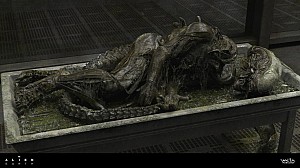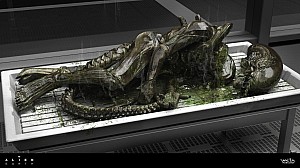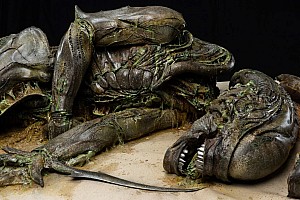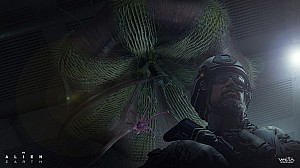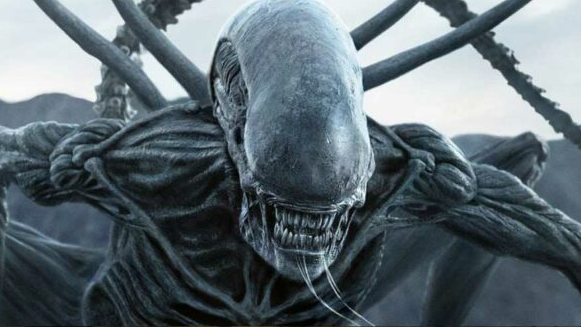Thus Spoke Zarathustra and clues to Prometheus
Prometheus Forum Topic
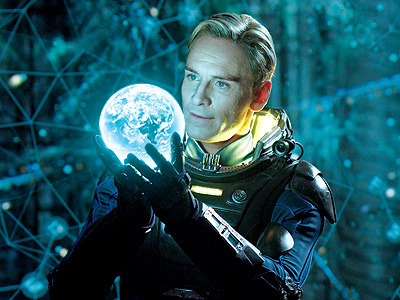
alxn
MemberOvomorphJun 22, 20124914 Views10 Replies Hello everyone, I am new here and I thought this might be an interesting discussion to have.
I poked around the new viral site i'm sure you've all seen and read through the wiki article linked to TSZ [Thus Spoke Zarathustra]. In the book, Nietzsche talks about the "superman" and of course how man is a bridge from animal to this greater state of being. there is an excerpt of the book that I think is relevant to what we saw in Prometheus and may help us understand Peter Weyland's motivations and those of the Engineers, or at least their natures:
[i][size=50]"I teach you the overman. Man is something that shall be overcome. What have you done to overcome him?
"All beings so far have created something beyond themselves; and do you want to be the ebb of this great flood and even go back to the beasts rather than overcome man? What is the ape to man? A laughingstock or a painful embarrassment. And man shall be just that for the overman: a laughingstock or a painful embarrassment. You have made your way from worm to man, and much in you is still worm. Once you were apes, and even now, too, man is more ape than any ape.
"Whoever is the wisest among you is also a mere conflict and cross between plant and ghost. But do I bid you become ghosts or plants?
"Behold, I teach you the overman! The overman is the meaning of the earth. Let your will say: the overman shall be the meaning of the earth! I beseech you, my brothers, remain faithful to the earth, and do not believe those who speak to you of otherworldly hopes! Poison-mixers are they, whether they know it or not. Despisers of life are they, decaying and poisoned themselves, of whom the earth is weary: so let them go!"
— Thus Spoke Zarathustra, Prologue, §3, trans. Walter Kaufmann[/size][/i]
It seems to me that Ridley Scott is a very deliberate director who enjoys playing games and getting people to think. I think Prometheus and it's sequel are meant to ask much bigger philosophical questions aside from "why was the med pod calibrated only for males?" and "what was the black goo?". It is meant to be a discussion and exploration into human nature, which is very cool and exciting to see in a movie. What are your thoughts?
Are the Engineers the "overmen"? and is Peter Weyland the bridge? Are the bio-mechanical, dark engineers at the end of Prometheus the result of trying to become greater that one can handle, are they a warning?
On that vein of thought, maybe the last Engineer was trying to warn Elizabeth about the dangers of playing God [since he saw how selfish Weyland was and that David was his creation].
Let's discuss! :)
Replies to Thus Spoke Zarathustra and clues to Prometheus
Hey Guest, want to add your say?
abordoliJune 22, 2012
alxn,
Welcome to [b]www.prometheus-mvie.com[/b]!
I can see now where Hitler, a reader of Nietzsche, got some of his crazy thinking regarding the [i]ubermensch[/i] and their role as taking their rightful seat as the superior race on Earth. Nietzsche's work is some fascinating philosophical material, but in the wrongs hands we saw how it was perverted to give a down-trodden country....hope....a purpose, although misguided.
How does my comment relate to Prometheus? Weyland was probably a reader of Nietzsche. It's kind of necessary reading for ego-maniacs.

alxnJune 22, 2012
Thank you very much!
That's the sad beauty of art and interpretation, it can be taken and turned into amazing things and it can be used for horrible things depending on who reads it.
in terms of Weyland it does make sense that he would pursue immortality and try to create an almost perfect being [David 8]. He was aiming to transcend into being "super"...but like the passage says "do not believe those who speak of other-worldy hopes" he misinterpreted what Holloway and Shaw found in his narcissistic way and ended up dying as the base emotional animal he tried to escape being.
garboozleJune 22, 2012
I think Weyland was trying to become the overman or viewed himself as the overman. There's a video of Weyland saying "I am law only for my kind, I am no law for all." And I do believe that in trying to achieve powers higher than we could handle is why the engineers want to exterminate mankind.

The TruthJune 22, 2012
There is already a thread about this but anyways as I already said in the overman is just the next step in the evolution of man. This is straight from wikipedia:
[i]Nietzsche injects myriad ideas into the book, but there are a few recurring themes. The overman (Übermensch), a self-mastered individual who has achieved his full power, is an almost omnipresent idea in Thus Spoke Zarathustra. Man as a race is merely a bridge between animals and the overman. Nietzsche also makes a point that the overman is not an end result for a person, but more the journey toward self-mastery.[/i]
This is also one of the central themes of 2001 a space odyssey. Interesting enough it is known that Ridley Scott is a fan of 2001. Just type in thus spoke zarathustra in google and you will get this.
[url]http://www.youtube.com/watch?v=cWnmCu3U09w[/url]

alxnJune 23, 2012
@garboozle hm, that would makesense
@thetruth oh I'm sorry, should I discuss this in the other thread?
I didn't know that, that's very interesting! maybe he's trying to tell the story of TSZ in these films... like the xenomorphs could be the out of control "animal" elements and then the engineers are Overmen and then there is man who is kind of stuck in the awkward in between trying to move forward?

CustodianJune 23, 2012
this whole thing stinks of EXHALTED MONKEY.
:)
2013 sci-fi horror novels 'Custodian' and 'Tandem' available from Amazon, B&N, iTunes etc...


Daniel_NJune 23, 2012
If Weyland is for his own kind meaning humans then that could be one way of looking at that statement- to be in conflict with The Engineers or their oganization or at least compete or make a demand for information... but then he takes no measures of going forth with a more militant force with a better plan other than to live longer... then again he was pressed for time/lifespan. If he meant he is for his own kind in a 'special kind of human' or a special kind of worldview at least then that kind of fits more with what happened... Hard to say..

ElectricAveFebruary 11, 2013
Hey guys. I've googled this a bunch the past week or so & I think I stumbled on some new ideas about the Zarathustra connection in Prometheus.
Basically, I have an idea that Weyland, Vickers, and David, are supposed to represent Zarathustra, The Last Man, and The Ubermensch (respectively). The Ubermensch-David thing in particular might offer some clues about his character development in Paradise. So I’ll explain each one starting w/Peter since he’s already dead. [url=http://juddofinternets.files.wordpress.com/2013/01/what-is-101112.png]Here is a screenshot[/url] of the book viral. And here is a quote from [url=http://insidemovies.ew.com/2012/06/11/prometheus-nietzsche-zarathustra/]ew.com[/url]:
_______________________________________________________
In case you couldn’t make out what Weyland was saying, it’s “I am a law only for my kind, I am no law for all,” also a quote from Zarathustra. This all appears to have something to do with the giant albino “Engineers” at the heart of Prometheus‘ creationist mythology, and Weyland’s monomaniacal desire to meet them so he can learn how to live forever. The suggestion is that the Engineers, in Weyland’s mind, are Nietzsche’s Übermenschen.
________________________________________________________
This does seem to be the consensus right now on the significance of the Ubermensch in the story, but we know that Weyland wasn’t talking about the Engineers in 2023. The term Ubermensch means Overman, Superman, or Beyond Man, which is also the basic description of a god, and Weyland certainly thought himself a god. More than likely, he recited those words b/c he thought of himself as an Ubermensch. But what struck me is that he was quoting [i]Thus [u]Spoke Zarathustra[/u][/i] just before [i][u]he spoke[/u][/i] to a mass audience.
Now I’d never read that book, so I checked it out on Spark Notes. At the beginning of the story, Zarathustra is introduced as a [i]prophet[/i] who speaks to the people about the [i]coming[/i] of the Ubermensch, and that made me see the speech in a whole new way. Weyland speaks on the progression of technology, beginning with fire and culminating with the most recent breakthrough: “Cybernetic individuals, who in just a few short years, will be completely indistinguishable from us.” In short, I think we’re meant to see Weyland as the prophet, and Androids as The Ubermenschen (David 8 in particular, because he is a revolutionary creation in the field of cybernetics, and our David specifically, because he is Weyland’s son/servant).
In the speech, Weyland draws a full circle from the Titan Prometheus of the past, to the Titan of Industry in the present. It gives the impression that we are at the beginning of a new cycle or phase in mankind’s evolution. This is basically the same idea Nietzsche was espousing. The Ubermensch represented all that was to come, while The Last Man represented the final chapter of our history.
________________________________________________________
The last man is a term used by the philosopher Friedrich Nietzsche in Thus Spoke Zarathustra to describe the antithesis of the imagined superior being, the Übermensch, whose imminent appearance is heralded by Zarathustra. The last man is tired of life, takes no risks, and seeks only comfort and security ….. The last man is possible only by mankind's having bred an apathetic creature who has no great passion or commitment, who is unable to dream, who merely earns his living and keeps warm.
________________________________________________________
Vickers sprang to mind as the antithesis of David for a few reasons 1)She is Weyland’s other child and opposite gender 2.) The luxury-laden lifeboat & the comment she made to Holloway [i]“I like to minimize risks”[/i] 3.) She seemed bored with the whole mission, and 4.)She was the last of the crew members to die (not counting Elizabeth b/c she’s our protagonist).
It’s not just Vickers, tho; there is an air of apathy to the rest of the crew as well. No one seemed the slightest bit inspired or interested in the mission briefing, and there are comments peppered throughout like “All I do is fly the ship” “I’m just here to make money” “There is nothing special about the creation of life.” Etc. You can even see it in Weyland a little bit. Yes, he funded a very risky & intrepid mission, but the whole reason for going out there turned out to be very small-minded and selfish: he just wanted to avoid death. I think everyone who ended up dying had a little bit of “last man” in them (and the only one who lived, Elizabeth, doesn’t fit the description at all).
Also, in the interviews, RS describes Vickers as the perfect Corporate [i]Man[/i] (derogative term for an individual who dedicates himself to his place of work at the expense of his hobbies, family, or friends), so maybe he’s making an analogy with the Last Man, saying that the Corporate Man is the last chapter in human history (before we destroy ourselves) and must be transcended.
So at some point while writing this, I had lost the tab w/the original wiki article, and when I went searching for it again, I stumbled on a completely different article with the same name. This is when it really clicked:
________________________________________________________
[i]The Last Man[/i] is an apocalyptic science fiction novel by Mary Shelley, which was first published in 1826. The book tells of a future world that has been ravaged by a plague. Mary Shelley states in the introduction that in 1818 she discovered, in the Sibyl's cave near Naples, a collection of prophetic writings painted on leaves by the Cumaean Sibyl. She has edited these writings into the current narrative, the first-person narrative of a man living at the end of the 21st century.
________________________________________________________
In the story, the plague begins in the year 2092, just one year off from the date of The Prometheus’ arrival (2093). The protagonist is a man named Lionel Verney- [u]Initials LV[/u] (and if zero is nothing than 223 is the year of Weyland’s TED Talk). Also, Vicker’s first name starts with M, just one letter off from L, so maybe her initials were also an obscure hint. But most important is the “collection of prophetic writings” found in a cave. I think it solves the question about the star maps that Elizabeth was so wrong about. If it was not an invitation, then perhaps it was a [i]warning[/i]. A prophecy. (Zarathustra). I’m not sure if the name of the book is directly related to Nietzsche’s Last Man, but nonetheless, the title and premise recall the events of LV-223. And Mary Shelley, of course, is author of the literary classic [i]Frankenstein; or, [u]The Modern Prometheus[/u][/i].
Ok, so what makes David the Ubermensch instead of say, the Engineers? Well, it’s pretty simple: The Engineers only satisfy one-half of what the Ubermenschen were supposed to be (superior beings, and the next natural step in our evolution). Although the Engineers are superior to us in many ways, they could not possibly be the next natural step in our evolution, because they are not [i]descended[/i] from us. They are, in fact, our creators - our [i]ancestors[/i] – and since they don’t meet the criteria, it leaves David as the only other possible candidate.
Following are quotes from the wikipedia article on the Ubermensch (only the parts that seemed relevant to David):
________________________________________________________
The first translation of Thus Spoke Zarathustra into English was by Alexander Tille published in 1896. Tille translated Übermensch as Beyond-Man.
________________________________________________________
David 8 is described as having capabilities that are well [i]beyond[/i] our own. [i]Literally[/i] Beyond-Man.
________________________________________________________
[b]The Übermensch and the Nazis[/b]
The term Übermensch was used frequently by Hitler and the Nazi regime to describe their idea of an Aryan master race
________________________________________________________
Straightforward here: Weyland is the Hitler to David 8’s Aryan ideal. The description of the TED Talk says that the speech was given in 2023 to a crowd of 35,000. When I googled “Hitler 35,000” I found that in 1923 (exactly 100 yrs prior), Hitler gave several speeches in Munich, and in that year alone, the Nazi party grew from just 6,000 members to around 35,000.
________________________________________________________
[b]Ubermensch as a goal[/b]
Zarathustra first announces the Übermensch as a goal humanity can set for itself. All human life would be given meaning by how it advanced a new generation of human beings.
________________________________________________________
Very similar to the point he makes in his [url=http://vimeo.com/50383392]TED Talk[/url], except in this story, the goal is technological progress & the new generation of human beings is A.I.
________________________________________________________
Zarathustra contrasts the Übermensch with the last man of egalitarian modernity, an alternative goal which humanity might set for itself.
________________________________________________________
He contrasts his own vision w/the last man’s in the extended version of the speech:
[i]”We wield incredible power (….) The question, of course (…) is what are we [i]allowed[/i] to do with this power? The answer to that, my friends, is [i]nothing[/i]. Rules, restrictions, laws, ethical guidelines, all but forbidding us from moving forward (….) Well, where were their ethics during the Arabian Conflicts? Where were the ethics when people were hungry in impoverished cultures? How is there a law that states if we build a man from wires and metal, a man who will never grow old, who will never feel the heat of a star or the cold of a moon, how is the creation of such an incredible individual considered unnatural? The answer to all these questions is simple. These rules exist because the people who created them were afraid of what would happen if they didn’t. Well I am not afraid. ”[/i]
So he sees the creators of those rules as the last men – unable to dream and afraid of change. And he contrasts the world they created as a result of their ethical goals (the Arabian conflicts, poverty & hunger, etc) with a better future that is offered by the pursuit of A.I as a goal.
Still, there is another layer to this, because Weyland’s goal is to create androids in order for [i]humans to live more comfortable lives[/i]. All of a sudden we become the last men – restricting the actions of our cybernetic counterparts through programming, because we’re afraid of what would happen if they had the same freedoms that we do. Nietzsche’s Ubermensch is supposed to transcend the limitations imposed by the last man, so I wonder if this means that David will ultimately choose not to return to earth? He tells Elizabeth towards the end that he’s not familiar with the concept of “want”, but how could he if he’s never known anything other than servitude to Weyland? Once he experiences freedom in Paradise, and gets a real sense of the difference between being free and being property of Weyland Industries, then he might develop and understanding of “want” - deciding that he doesn’t want to go back…
________________________________________________________
The last man appears only in Thus Spoke Zarathustra, and is presented as a condition that would render the creation of the Übermensch impossible.
________________________________________________________
Weyland’s pov: He thinks that the rules & regulations of the last man stand in the way of fulfilling his ambitions.
David’s pov: He is now on a path of personal discovery and self-actualization that would be impossible if Vickers & Weyland were still around.
________________________________________________________
[b]Death of God and the creation of new values[/b]
Zarathustra ties the Übermensch to the death of God. While this God was the ultimate expression of other-worldly values and the instincts that gave birth to those values, belief in that God nevertheless did give meaning to life for a time. 'God is dead' means that the idea of God can no longer provide values. With the sole source of values no longer capable of providing those values, there is a real chance of nihilism prevailing.
________________________________________________________
Another straightforward analogy to David and Weyland ([i]“What happens when Weyland is no longer around to program you?”[/i]). Weyland’s death leaves a vacuum that can be filled either by nihilism, the Engineers’ influence, or Shaw’s influence.
________________________________________________________
Zarathustra presents the Übermensch as the creator of new values. In this way, it appears as a solution to the problem of the death of God and nihilism (….) In order to avoid a relapse into Platonic idealism or asceticism, the creation of these new values cannot be motivated by the same instincts that gave birth to those tables of values. Instead, they must be motivated by a love of this world and of life (….) the new values which the Übermensch will be responsible for will be life-affirming and creative.
________________________________________________________
If you’ve read the original script by Spaihts’, you’ll notice that the Ubermensch thing was certainly there in David’s characterization, but it didn’t really follow [i]Zarathustra[/i]. It had David attaining freedom quickly, rather than making a journey out of it, and there was no parallel with the Death of God (he just hated humans from the very beginning, ala Skynet). There are some things in the original script that are superior, but imo, David’s characterization isn’t one of them. He reminded me a lot of Ash, and while I don’t mind if he ends up going that way eventually, I’d still like to [i]see[/i] how he works that out in his head (vs. making him antagonistic by design, and just another obstacle for the heroine). Feel free to disagree :)
________________________________________________________
This-Worldliness
Nietzsche introduces the concept of the Übermensch in contrast to the other-worldliness of Christianity: Zarathustra proclaims the Übermensch to be the meaning of the earth and admonishes his audience to ignore those who promise other-worldly hopes in order to draw them away from the earth.
________________________________________________________
I think David & Shaw are literal representations of “this-worldliness” vs. “other-worldliness”. The whole movie is about being “drawn away from the earth”, to find answers in an “other world”, and it’s all motivated by Shaw’s Christian faith. As we know, it all goes horribly wrong, and had that been the end, Nietzsche’s admonition would seem almost like the moral of the story.
The irony, is that the Ubermensch-to-be is the one who rekindles the possibility of travelling to that “other world” (he is Pandora’s last Hope). He keeps her cross on his belt (symbolically “keeping the faith”), and she puts it back on ([i]“You still believe, don’t you?”[/i]). From a believer’s perspective, David could be a true blessing… (note: Shaw might also represent a similar philosophical archetype: Kierkegaard’s Knight of Faith. Kierkegaard is another prominent existentialist, and the two philosophers [url=http://altman.casimirinstitute.net/kierkegaard.pdf]share a few things in common[/url]).
________________________________________________________
Zarathustra declares that the Christian escape from this world also required the invention of an eternal soul which would be separate from the body and survive the body's death (….) Zarathustra further links the Übermensch to the body and to interpreting the soul as simply an aspect of the body.
________________________________________________________
So Nietzsche believes in a [i]mortal[/i] soul. I think maybe David will come to believe that about himself, at least. The question “What do you believe?” is brought up in Shaw’s dream. Later during the mission briefing, Weyland comments that David doesn’t have a soul, and we get a close up of him looking upset. Then a few mins later, Shaw is asked about the invitation and she says “It’s what I choose to believe.” We get another close up of David and he has this funny look – like he’s thinking about it…
________________________________________________________
[i]Definition of Eternal Return/Recurrence:
Eternal return (also known as "eternal recurrence") is a concept which posits that the universe has been recurring, and will continue to recur, in a self-similar form an infinite number of times across infinite time or space. The concept is found in Indian philosophy and in ancient Egypt and was subsequently taken up by the Pythagoreans and Stoics. With the decline of antiquity and the spread of Christianity, the concept fell into disuse in the Western world, though Friedrich Nietzsche resurrected it as a thought experiment to argue for [u]amor fati[/u]. In addition, the philosophical concept of eternal recurrence was addressed by Arthur Schopenhauer. It is a purely physical concept, involving no supernatural reincarnation, but the return of beings in the same bodies. Time is viewed as being not linear but cyclical.[/i]
[u][b]Relation to the Eternal Recurrence[/b][/u]
The Übermensch shares a place of prominence in Thus Spoke Zarathustra with another of Nietzsche's key concepts: the eternal recurrence of the same. Over the course of the drama, the latter waxes as the former wanes. Several interpretations for this fact have been offered.
Laurence Lampert suggests that the eternal recurrence replaces the Übermensch as the object of serious aspiration. This is in part due to the fact that even the Übermensch can appear like an other-worldly hope. The Übermensch lies in the future — no historical figures have ever been Übermenschen — and so still represents a sort of eschatological redemption in some future time.
Stanley Rosen, on the other hand, suggests that the doctrine of eternal return is an esoteric ruse meant to save the concept of the Übermensch from the charge of Idealism. Rather than positing an as-yet unexperienced perfection, Nietzsche would be the prophet of something that has occurred an infinite number of times in the past.
Others maintain that willing the eternal recurrence of the same is a necessary step if the Übermensch is to create new values, untainted by the spirit of gravity or asceticism. Values involve a rank-ordering of things, and so are inseparable from approval and disapproval; yet it was dissatisfaction that prompted men to seek refuge in other-worldliness and embrace other-worldly values. Therefore, it could seem that the Übermensch, in being devoted to any values at all, would necessarily fail to create values that did not share some bit of asceticism. Willing the eternal recurrence is presented as accepting the existence of the low while still recognizing it as the low, and thus as overcoming the spirit of gravity or asceticism.
Still others suggest that one must have the strength of the Übermensch in order to will the eternal recurrence of the same; that is, only the Übermensch will have the strength to fully accept all of his past life, including his failures and misdeeds, and to truly will their eternal return. This action nearly kills Zarathustra, for example, and most human beings cannot avoid other-worldliness because they really are sick, not because of any choice they made.
________________________________________________________
To me, this point is the most confusing point in his philosophy, but you can see some clear, superficial connections to David, from the infinity symbol in his name, to Weyland’s ambition & ultimate demise for creating him (the punishment of Prometheus = eternal recurrence :wow:). Also, it’s interesting that so many ancient cultures viewed time as cyclical (much like the star maps shared across ancient societies in Prometheus). Makes me wonder if time travel will figure into the storyline (8 as an infinite time loop - although I'm not a big fan of time travel, unless the story is very well-grounded. I guess we'll see).
Well, that's all I have for now. I hope it's new & interesting for everyone :) I'd really like to discuss Shaw as the Knight of Faith (as Kierkegaard is really my forte) but that might be for another thread...
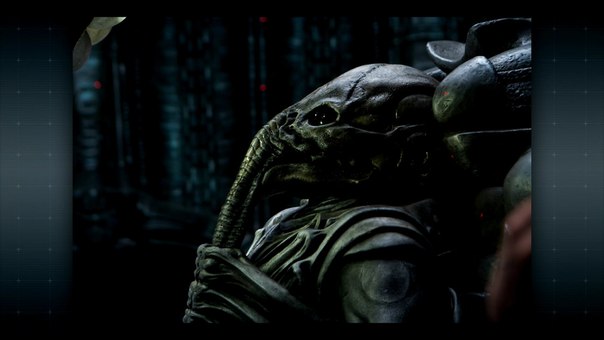
Anunnaki50February 14, 2013
Could be but maybe only excerpts from this particular story, remember this is not solely based on Zoroastrianism but based on something earlier. Zarathustra is man who figured this stuff out and summed it all up from past ancient cultures. You might be overthinking this because its based apon the stories of ancient Egypt, Sumer, Greek, and Hindu mythology. I do agree on what you said about David though.
The Anunnaki were on the earth in those days--and also afterward--when the sons of God went to the daughters of humans and had children by them. They were the heroes of old, mighty men of high reno
Are you an avid Alien fan looking for a dedicated online community of likeminded fans? Look no further! Create your own profile today and take part in our forums and gain XP points for all the content you post!


